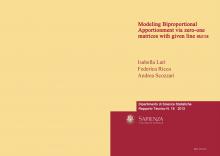Autore:
I. Lari, F. Ricca, A. Scozzari
Abstract:
In the Biproportional Apportionment Problem (BAP) a matrix of the vote counts of the parties within the constituencies is given, and one has to convert the vote matrix into an integer matrix of seats “as proportional as possible” to it, subject to the following constraints: i) each constituency must be granted its pre-specified number of seats; ii) each party must be allotted the total number of seats it is entitled to on the basis of its national vote count; iii) a zero-vote zero-seat condition must be satisfied. The matrix of seats must simultaneously meet the integrality and the proportionality requirements and this not infrequently gives rise to self-contradictory procedures in the electoral laws of some countries, such as, for example, Italy. Correct procedures exist for BAP but they are generally not suitable to be written in an electoral law and simpler procedures are needed in order to be acknowledged by legislators and citizens. Without the zero-vote zero-seat condition, that is, when all parties receive some votes in each constituency, BAP can be solved via a very simple procedure based on a central result of the theory of (0, 1)-matrices with given line sums provided by Gale and Ryser in the 60’s. In fact, once the floor of the quota has been assigned to each party in each constituency, basing on the remainders, a very simple rule can be applied to complete the seat matrix with the residual seats. On the contrary, the presence of zeros in the input vote matrix forces zero cells also in the output matrix (fixed zeros) and the previous procedure does not apply any more. In this paper we consider the problem under the fixed zeros condition and analyze specific configurations of the vote matrix for which we show that a modified version of the Ryser procedure works well. For these cases we also state necessary and sufficient conditions for the existence of a feasible solution. Although our analysis does not cover all possible cases, we provide new results on (0, 1)-matrices with given line sums and fixed zeros which has a central role in the more general area of combinatorial matrix theory.
Parole Chiave:
(0, 1)-matrices with given line sums, matrices with fixed zeros, biproportional
Tipo di pubblicazione:
Rapporto Tecnico
Codice Pubblicazione:
18
Allegato Pubblicazione:
Contatto:
ISSN:
2279-798X


